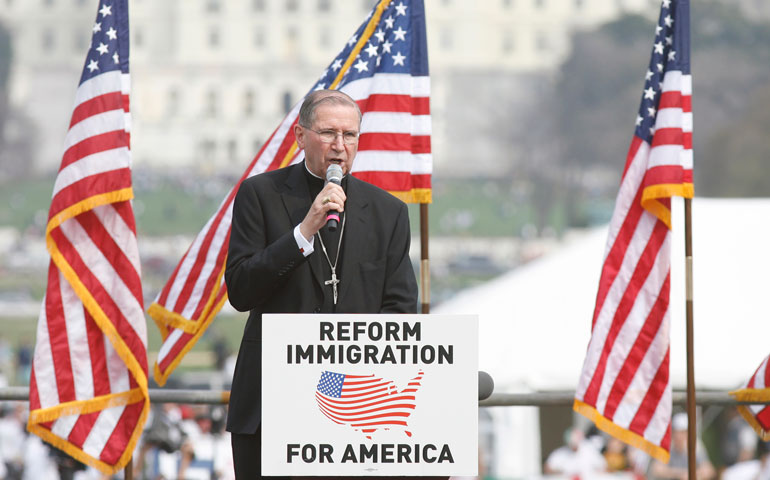
Los Angeles Cardinal Roger M. Mahony speaks during an immigration rally on the National Mall in Washington March 21, 2010. (CNS/Nancy Wiechec)
Before his name became connected with failing to adequately address clergy abuse of minors, Cardinal Roger Mahony of Los Angeles was better known for his reputation as one of the nation's leading church advocates of social justice, particularly for farmworkers and immigrants.
As a young priest in Fresno, Calif., during the 1965-70 Delano Grape Strike, Mahony became a nationally known figure.
Joining forces with nationally noted labor priest Msgr. George Higgins and Auxiliary Bishop Joseph Donnelly of Hartford, Conn., in the U.S. bishops' ad hoc Committee on Farm Labor, the three helped mediate the conflict between California grape growers and their predominantly Mexican and Filipino migrant workers.
During his seminary years, Mahony became fluent in Spanish while working with the braceros, temporary Mexican farmworkers brought into the U.S. yearly to harvest crops. His work as the key on-site coordinator for the committee's mediation work eventually led to the formation of Cesar Chavez's United Farm Workers, as well as to major advances in just wages and working conditions for farm laborers.
Ordained a priest in 1962, Mahony was not yet 39 when he was named auxiliary bishop of Fresno in January 1975. That same year, California Gov. Jerry Brown named him the first chairman of the state's newly formed Agricultural Labor Relations Board.
Five years later, Mahony became bishop of Stockton, Calif., and was named archbishop of Los Angeles in 1985. He was made a cardinal in 1991.
Mahony was a leading advocate for reform when Congress debated new immigration legislation in 2005-2006, at one point vowing mass civil disobedience in Los Angeles parishes if a bill making it a felony to aid an undocumented immigrant passed.
Before stepping down in February 2011 as Los Angeles archbishop, Mahony pledged to devote his post-retirement energies to the cause of millions of undocumented U.S. immigrants, seeking legislation offering humane treatment and a path toward citizenship.
A year later he, along with Migration and Refugee Services of the U.S. Conference of Catholic Bishops, launched a campaign to bring a national grassroots movement for just and humane immigration reform to the campuses of U.S. Catholic higher education.
The announcement came at the annual meeting of the Association of Catholic Colleges and Universities, an organization of presidents and other leaders of some 230 such U.S. institutions. Mahony was scheduled to give an update on the campaign's progress Feb. 4 at this year's meeting in Washington, but backed out the week before, just days before Gomez's letter restricting his activity became public.
Mahony's record on clergy sexual abuse of minors in the years before, during and after the 1980s has been widely criticized for withholding information on abusive priests from police and other civil authorities. He also engaged in tough, combative legal fights to prevent disclosure of confidential archdiocesan records in hundreds of victims' lawsuits.
But archdiocesan efforts to protect assets and minimize disclosure in court proceedings -- standard legal strategies by virtually anyone facing a lawsuit -- are only one part of the Mahony picture. Another piece is his record in his own archdiocese, the largest in the United States, in tackling the systemic problem of widespread clergy sexual abuse of minors in the U.S. Catholic church.
At their June 1985 meeting in Collegeville, Minn., the U.S. bishops -- for the first time acknowledged on public record -- devoted a substantial part of their meeting to discussing the ramifications of clergy sexual abuse of minors and how to deal with the issue more effectively. The following year, Mahony said he had an attorney address archdiocesan priests on the topic at their annual retreat.
Allegations of abuse in the archdiocese peaked during the 15 years of Mahony's predecessor, Cardinal Timothy Manning, averaging more than 40 cases per year, according to a chart accompanying the Jan. 31 court-ordered document release of allegations against Los Angeles clergy since 1931.
The chart indicates that the number of cases dropped sharply after Mahony was installed as archbishop in September 1985. That year it shows there were 27 cases of alleged abuse that later came to light, and by 1992, it was eight.
In 1993, the U.S. bishops opened their internal debates to the public forum, creating an ad hoc committee to study clergy sexual abuse and related issues. On many of the recommendations produced, Mahony had either already implemented similar policies or quickly followed the suggestions.
Since 2001, there has been no more than one new case of alleged abuse reported per year, according to the chart.
[Jerry Filteau is NCR Washington correspondent. His email address is jfilteau@ncronline.org.]



